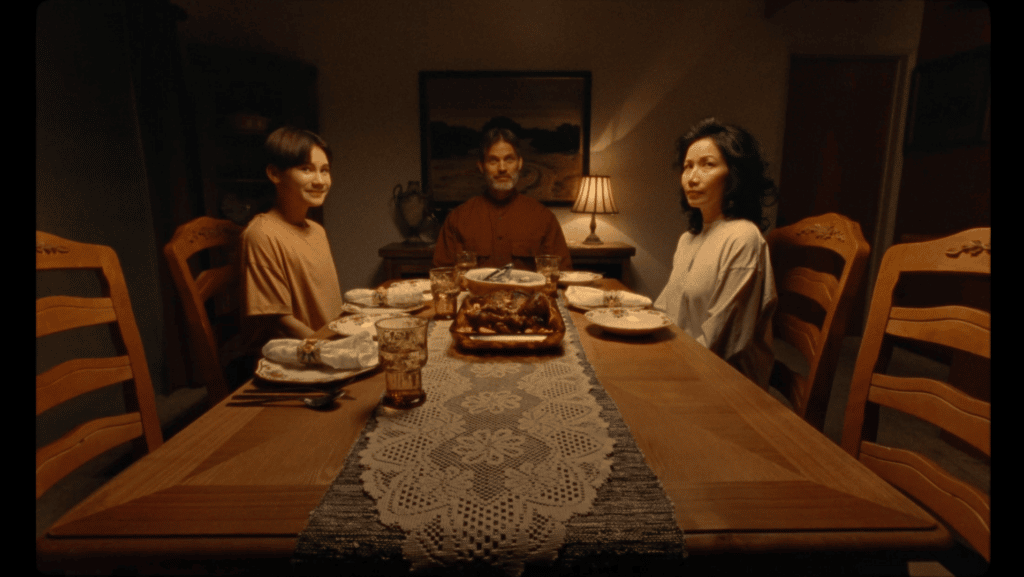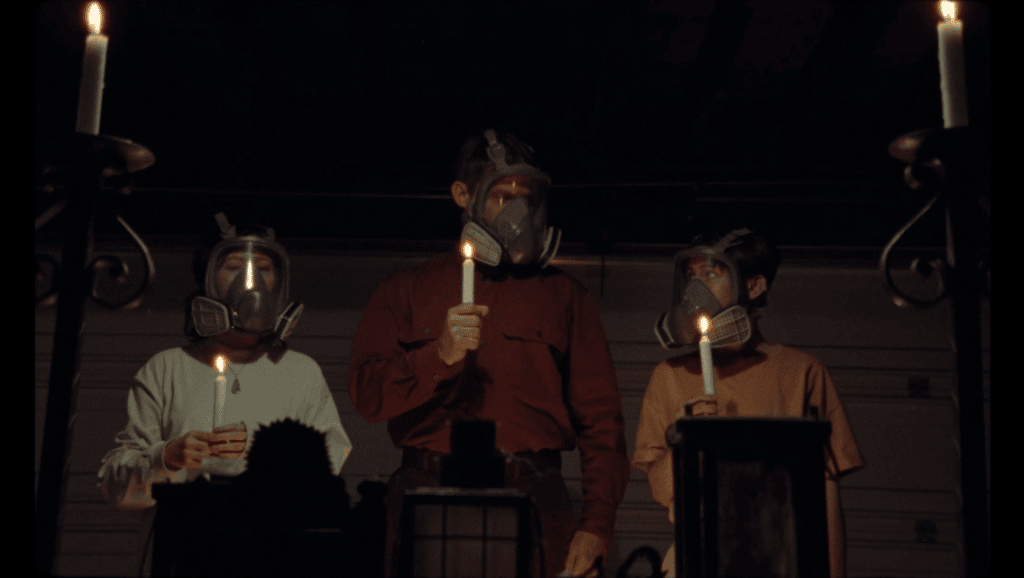Casper Van Dien is best known to audiences as Starship Troopers’ Johnny Ricco. The film thrust him into the spotlight and the actor has been steadily working ever since. Having carved out a niche career within the world of science-fiction and b-movies, the actor now turns his attention to something more stripped back and horror adjacent as he steps into the role of Father in Corey Deshon’s Daughter.

Daughter marks writer and director Corey Deshon’s first steps into feature films. It’s an accomplished debut and one whose simple premise masks a closet full of enigmas. The story sees a young woman (Vivien Ngô) ‘saved’ and brought to a secluded farmhouse. Upon arrival she is told by a man known only as Father (Casper Van Dien) that she is now to fulfil the role of Daughter. Her new role will allow her to fit in with her new ‘family’, which also includes Mother (Elyse Dinh) and Brother (Ian Alexander). The group lives off of the grid, contained within their house due to a deadly disease that has ravaged the planet. Believing Brother to be special, Father insists upon the perfect family unit to keep his son happy, but will Daughter provide the missing element, or will she fail to live up to expectations like those before her?
Daughter charts its story with the use of seven chapter points. These boundaries help portion the narrative into bitesize sections and draw a deeper focus into what is happening. The plot essentially revolves around hopes of a successful indoctrination of the new addition and Deshon pulls maximum tension from the set-up. Though obviously feisty and street-smart, Daughter opts to play a long version of a battle of wills with Father. Eager to please, she falls in line early, but she still manages to push Father’s buttons. It’s a scenario not too dissimilar to the dynamic between some real-world fathers and their teenage daughters, but takes on a sinister edge within this set-up. There’s a danger and sense of threat in the air during each and every one of Father and Daughter’s interactions, which makes the film progressively more uncomfortable to watch.
This ever-present sense of trepidation and dread is a testament to the performances of the four cast members. Van Dien is remarkable as the Patriarch of the household. He has played the villain before, but Father isn’t a textbook bad guy. Driven by his own beliefs, Father is a very real person. His closed-minded vantage on the world around him helps sell the concept of Father. This is the kind of conspiracy theory mad man that could, and likely does to some degree, exist. Rather than be the typical religious zealot that these kinds of stories love to circle, Father is his own entity. For reasons undisclosed, Father is desperate to create the perfect family environment, no matter the lengths or consequences. With such a complex character Van Dien, for once, has plenty of depth and layers to explore and through Father gives one of the best performances of his career thus far. Careful not to create a caricature villain, Deshon shies away from demonstrating Father’s wrath through aggression and violence. Instead, everything rests upon Van Dien’s posture and tone of voice. It’s more restrained work that the actor has become used to, but is proof that there’s more to him than a stock sci-fi character.
Father cannot hold the film alone though. Vivien Ngô is excellent as the newly recruited Daughter. Saying very little, she communicates all she needs to the audience. There is resilience and intelligence glimpsed the instant Daughter appears on screen, and the viewer is immediately willing her to escape. What makes Le’s performance so strong is that, although told that there have been other Daughters, the audience have not seen them and yet they instantly know that this version is unlike the others. This is a smarter Daughter, one who might stand a chance against the strange man at the head of the house. Elyse Dinh also gives a complex performance through a character who doesn’t on the surface appear to have much going on. The hidden depths to Mother are drawn out through Dinh’s performance and are so strong one can almost imagine the film as being her story.
Rounding out the cast is Ian Alexander. Although the youngest of the cast, Alexander equals the performances of those around him. His character is perhaps the hardest to navigate as, despite being presented as something of a naive and spoiled brat, Brother isn’t as unaware of the situation as he suggests. Whereas Daughter fights against this, Brother is reluctant to change and so willingly accepts a revolving door of family members. Something of an odd bird, Alexander keeps Brother just the right side of strange, pushing the viewer to cast suspicions on his intents and motives.

Daughter keeps the script sparse, Deshon utilising cleverly constructed camera angles to fill in the blanks. There’s a difference to how the camera behaves, one that is dependent on which characters are interacting. Right from the very start there’s a clear distance between Father and Daughter. Scenes between the pair are shot from a distance. The camera keeps to the far corners of the rooms, distorting the viewpoint, communicating space between the viewer and Father, and in doing so replicating Daughter’s feelings toward him. This visual separation contrasts with the camera treatment of scenes between Mother and Daughter. In these moments the camera is vastly closer, capturing the intimacy of the two strangers. For scenes between Daughter and Brother, the camera falls somewhere in the middle, though gradually it starts to work closer in.
Even in sequences involving all group members, the positioning of characters silently communicates allegiances and ways of thinking. One nighttime scene has Father standing and reciting a story to his family. He looms over the rest of the characters who are sitting on a sofa. Whilst Mother and Brother are huddled together on one side, a cushion subtly works in a space separating Daughter from them. It’s a sophisticated way to articulate emotions and states of mind without explicitly voicing them. This intricate method of storytelling demonstrates a maturity to the fledgling director’s work.
Almost all of Daughter unfolds within the walls of one building. At the guidance of Father, the family must remain inside to stay safe. Any trips outside involve the wearing of gas masks and boiler suits so as to protect the youngest of them from contracting the deadly virus that looms out there. With little in the way of landscape to see, Daughter could look a little bland. Deshon however, brings the outside in. Rather than be dark and dimly lit, Deshon ensures the house is bright. Illuminated by a hazy, warm sun, the building is almost always bathed in ‘magic hour’ light. Deshon continues to bring the outside in with the overuse of wood in the mise-en-scene. The chairs, abundance of shelves and various other paraphernalia are all various shades of brown, conjuring ideas of woodlands. The ‘uniforms’ that each family member wears also align with browns and autumnal shades, again bringing elements of nature into what could have been a sterile and unremarkable surrounding.
There is so much complexity to Corey Deshon’s work that these elements are only the tip of the iceberg. Daughter shot on 16mm to ensure maximum quality of image. Daughter is a mesmerising and beautifully dangerous cinematic experience. Incredibly layered and intricately planned, Daughter demonstrates an almost genius level of technical skill and visual flourishes. Assisted by nuanced performances across the board, Daughter possesses an unquantifiable abundance of talent across the board. A well-worn idea filtered and distilled through a new perspective Daughter is an exceptional debut.
Daughter
Kat Hughes
Summary
A technical marvel, in Daughter first-time director Corey Deshon has crafted an exceptionally intricate film that flips conventions and expectations on their head. Aided by striking performances from all the cast, and a career-best turn from Casper Van Dien, Daughter is set to take the festival circuit by storm.
Daughter was reviewed at Arrow Video FrightFest 2022. Daughter is released on Digital HD on Monday 20th February.
Kat Hughes is a UK born film critic and interviewer who has a passion for horror films. An editor for THN, Kat is also a Rotten Tomatoes Approved Critic. She has bylines with Ghouls Magazine, Arrow Video, Film Stories, Certified Forgotten and FILMHOUNDS and has had essays published in home entertainment releases by Vinegar Syndrome and Second Sight. When not writing about horror, Kat hosts micro podcast Movies with Mummy along with her five-year-old daughter.

Latest Posts
-


Film News
/ 8 hours ago‘Nosferatu’ first reactions light up the web
The Nosferatu first reactions are in and it looks like the new work from...
By Paul Heath -


Film Trailers
/ 13 hours agoTeaser for Cannes movie ‘Armand’ with Renate Reinsve
Ahead of a release stateside, Cannes awards winner Armand with Renate Reinsve has just...
By Paul Heath -


Home Entertainment
/ 13 hours ago‘Salem’s Lot’ sets digital release
Stephen King adaptation Salem’s Lot is getting a UK digital release. The film went...
By Paul Heath -


Film News
/ 16 hours agoWatch: The global press conference for festive film ‘Red One’
The movie is now playing in cinemas.
By Paul Heath















